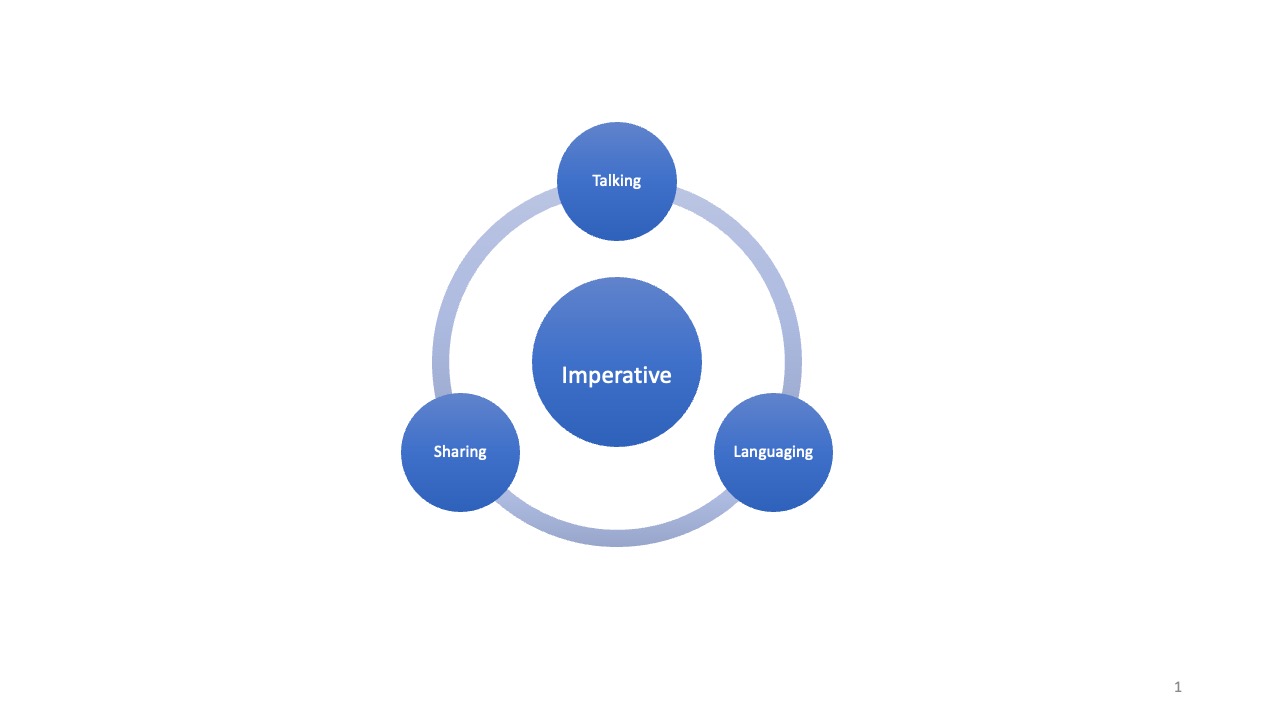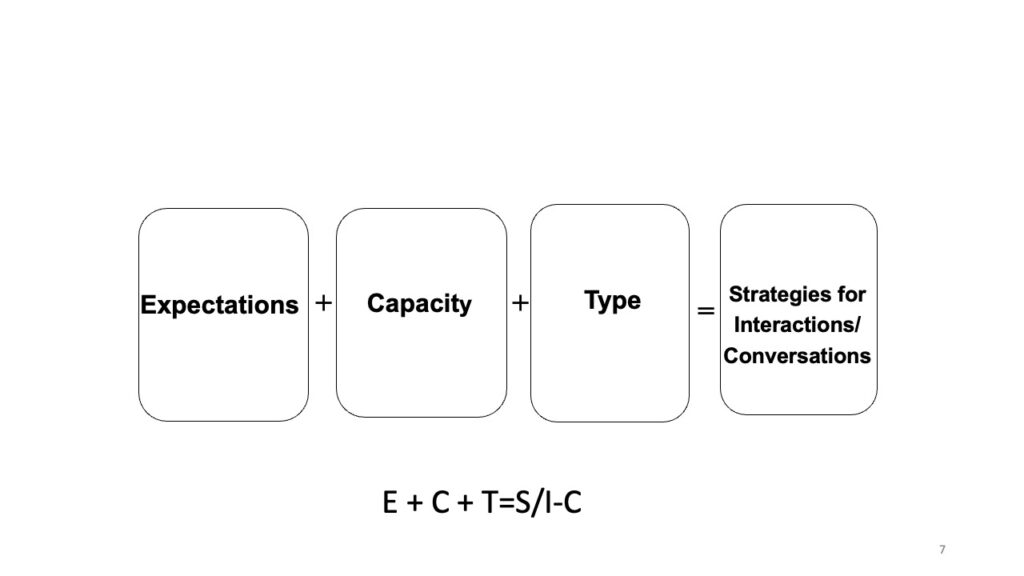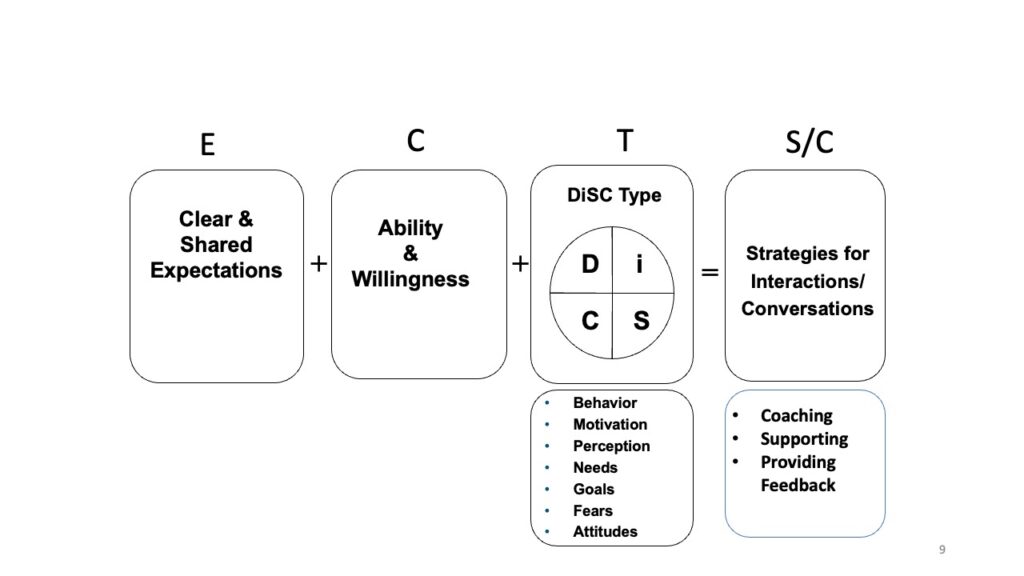Our paper, “The New Normal & The Conversational Imperative,” noted that organization-wide conversations are essential since all our “normals” are “new.” Why?
- To deepen an appreciation of employees’ needs
- To share information and ideas
- To provide feedback through a common, non-threatening language, and
- To share coping mechanisms and other innovative responses.
In our work, we often highlight the types of “conversations” that need to take place in an organization: Strategies for Workplace Interaction: Reference Guide A DiSC®-Based Approach

Communicating Openly and Effectively
The Conversational Imperative requires that we sharpen our abilities “to converse” openly and effectively.
The conversation is “imperative” because the New Normal brings about “fear,” and fear can get in the way of communicating and sharing. “Fear” often keeps employees from hearing and listening, and an ordinarily tricky process of giving and receiving feedback gets even more difficult.
Also, while “communication” is a fundamental skill, and while most of us can do it well enough to get by, we can all probably use some improvement in our “skills at communicating.” Unfortunately, we all too often take it for granted. ”
We must continually enhance our “language skills” to increase communication effectiveness.
Adopting and Applying a Non-Threatening Language
The Conversational Imperative requires that we adopt a common, non-threatening language to share information, ideas, and feedback. We also must learn how to read others and see how others interpret their behavior to get a gut-level appreciation for our co-workers’ needs.
“Communication” is more than talking and listening.
Genuine communication requires a deep understanding of another person’s perspective. But when you take into consideration all our biases, behavioral quirks, unspoken emotions, personal agendas, and unshared assumptions, this can seem almost impossible.
Implementing a Forum for Harnessing Individual and Collective Insights
The Conversational Imperative requires a “conversational process for fostering constructive dialogue, accessing collective intelligence, creating innovative possibilities for action.”
One fundamental assumption for this process is that “people already have within them the wisdom and creativity to confront even the most difficult challenges.”
In this era of the New Normal, we must “rely on each other” to steady ourselves because we realize that we must develop coping strategies to thrive in an environment where “the normal will always be new.”
Strategies of Interaction
We’ve developed a model. Our model suggests that an appropriate strategy for interaction is for everyone to know their expectations, capacity, and type. That is, S/I-C equals Expectations (E) + Capacity (C) and Type (T).

According to our model, there must be clear and shared expectations (E), ability & willingness (C), and recognition and honoring of DiSC Types (T).

Since “types” are “types of behavior,” we must consider the drivers of observable behavior.
Once we can specify E + C + T, we can decide our strategies for interaction: coaching, supporting, or empowering.
In addition, we will have a framework for approaching the four key conversations we have to hold:
- Compensation
- A conversation around how much someone is or should be getting paid.
- Performance
- A conversation around how well someone is meeting expectations.
- Professional
- A conversation around how one’s career is developing.
- Change conversation
A conversation around
- Learning how to listen, hear, honor and accept what people are saying or would like to say; and
- Creating a non-threatening environment where to share and honor various assessments
For additional information, see Strategies for Workplace Interaction: Reference Guide A DiSC®-Based Approach in our Reading Room
Check out our other organizational development papers in our “Reading Room”
- The Preferred Choice: The DC Department of Public Works—The Agency of Choice for Taxpayers, Customers, Stakeholders and Employees
- The Purpose, Trust, and Personal Responsibility Initiative
- Shared Direction: Collective Decisions & Joint Implementation: Our Approach To Strategic Planning
- The New Normal & The Conversational Imperative
- Drivers of Observable Behaviors: Improving Our Skills in Managing Direct Reports
